Dive Brief:
- The U.S. Global Change Research Program has released its fourth National Climate Assessment, which concludes that human activity is a dominant cause of global warming. The government is required to compile this report every four years, and it is written by dozens of authors from a variety of federal government agencies and other stakeholder organizations, with the National Oceanic and Atmospheric Administration (NOAA) serving as the lead agency.
- The report cites a global air temperature increase of 1.8 degrees Fahrenheit over the past 115 years. It notes a 7- to 8-inch increase in sea levels since 1900, with nearly half of that occurring since 1993. It claims a possible 1- to 4-foot rise in sea levels by 2100, or even worse depending on Antarctica's stability.
- In addition to the known changes, the report expresses concern over the many dangerous unknowns that scientists can't yet predict but that could rapidly intensify climate change.
Dive Insight:
While a variety of human activities can contribute to global warming, the report cites greenhouse gas emissions as a huge element. The report says there is "no convincing alternative explanation" for global warming over the last century. It lists a number of other detrimental effects of climate change besides just temperature increases, such as ocean acidification, large forest fires and rising sea levels.
The report says sea level rise is contributing to an increase in daily tidal flooding in 25 states. Flooding trouble from climate change-associated "king tides" already is well documented in Miami, Fort Lauderdale and other parts of South Florida, where streets now regularly flood during certain tidal pulls even when it hasn't rained. Researchers anticipate more areas, especially those along the Atlantic and Gulf coasts, will experience similar flooding in the near future.
Rising sea levels are one reason cities should examine their flood resilience plans, and another is the report's statement that more extreme precipitation — droughts in some regions and intense, frequent rain in others — is occurring in the United States. Plus, models show an increase in the number and intensity of hurricanes. Many cities already are taking steps to become more flood-ready, especially those with coastal locations.
President Trump and some of his high-ranking administration officials — including Environmental Protection Agency Administrator Scott Pruitt and Secretary of Energy Rick Perry — have voiced skepticism about humans' influence on climate change. The administration is looking to boost fossil fuel production and repeal measures to reduce carbon emissions. President Trump also announced his intent to leave the Paris climate agreement.
Although some scientists had worried that the administration might interfere with the release of the climate change document or alter its content, representatives from NOAA report that didn't end up happening. However, the administration's actions and stated goals imply that it will not launch measures to protect the environment, and it doesn't appear likely that it would offer support for municipal environmental measures.
Local governments across the country have taken a plethora of actions to combat climate change and its effects. From committing to their own renewable energy and carbon reduction plans to signing a global declaration to promote clean transit, U.S. cities are making strides on their own. Based on the Trump administration's views, municipal efforts are a better bet for spurring environmental measures than hoping the federal government will lead the action. Plus, the report says extreme climate events will affect human safety, infrastructure and water quality, all of which municipal governments already typically handle to protect their citizens.











